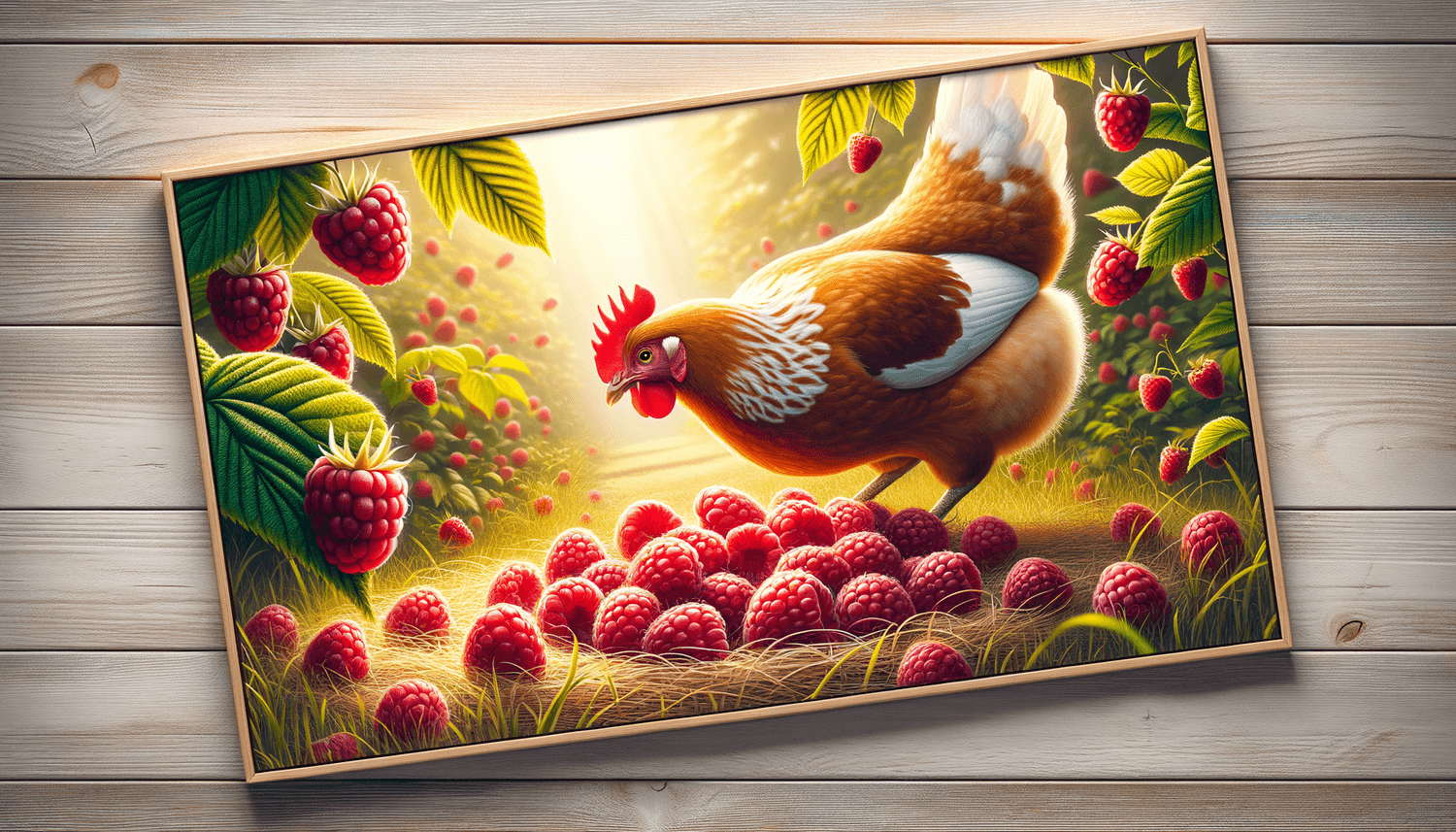Have you ever stared at a juicy raspberry bush and wondered if your cheeky, feathered friends could join in on the fruity feast? Well, you’re in luck because today’s fun-packed blog post is all about whether chickens can (or should) eat raspberries! We’ll dive deep into the delicious world of raspberries, discussing the importance of a balanced diet for our clucking companions while exploring the tasty treat’s nutritional value, benefits, potential risks, and even how to prepare it for your fowl friends. Spoiler alert: berry exciting information awaits!
Can chickens eat raspberries?
Yes, chickens can eat raspberries and it is safe for them to do so. Raspberries are a nutritious and delicious treat packed with vitamins and antioxidants that can benefit your backyard flock. However, it’s important to feed them raspberries in moderation, as part of a balanced diet, to ensure they receive all the nutrients they need to stay healthy.
A balanced diet for happy hens
Just like humans, chickens need a balanced diet to maintain optimal health and lead happy, productive lives. This is particularly important when it comes to laying hens, as the proper nutrients are crucial for egg production. A chicken’s diet should primarily consist of a high-quality chicken feed, which should make up around 80-90% of their diet. This ensures that your chickens are receiving enough protein, vitamins, and minerals to meet their nutritional needs, supporting growth, and ensuring a healthy immune system.
The remaining 10-20% of their diet can consist of treats like fruits and vegetables, which provide a delightful and flavorful means to supplement their primary chicken feed intake. While treats can be a fun way to bond with your feathered friends, it’s important to strike the right balance. Overindulging in treats could lead to nutrient imbalances, obesity, or digestive issues in your flock. So, when it comes to feeding raspberries or other goodies, moderation is key for maintaining the health and happiness of your backyard chickens.
Nutritional value of raspberries for chickens.
Raspberries are not only a tasty treat for chickens but also provide a variety of nutritional benefits. These delightful berries are packed with vitamins, including high levels of vitamin C and vitamin K. Vitamin C is essential for a strong immune system and overall good health, while vitamin K is important for blood clotting and bone metabolism. Additionally, raspberries contain moderate amounts of vitamin E and several B-complex vitamins, which benefit your flock by supporting their immune system and maintaining healthy feathers.
As for minerals, raspberries offer some valuable contributions to a chicken’s diet. They contain significant amounts of manganese, which plays a role in bone development, metabolism, and antioxidant function. Copper, iron, magnesium, and potassium are also present in smaller amounts. On top of the vitamins and minerals, raspberries are a good source of dietary fiber, helping to support healthy digestion in your birds.
Besides the nutrient-packed nature of raspberries, they also boast an impressive water content, making them a hydrating treat, especially during warmer weather. Chickens will benefit from the added hydration that raspberries provide, keeping them feeling refreshed and comfortable on hot days. This water content, combined with the various vitamins, minerals, and other nutrients, makes raspberries a desirable, healthful treat for your chickens to enjoy in moderation.
Nutrition table of raspberries for chickens.
| Information | Description |
|---|---|
| Nutritional Value | High in vitamins C and K, moderate amounts of vitamin E and B-complex vitamins, minerals such as manganese, copper, iron, magnesium, and potassium, and dietary fiber. |
| Suggested Serving Size | Small portions as an occasional treat, making up no more than 10-20% of their diet alongside other fruits and vegetables. |
| Safe Feeding Practices | Moderation is essential to avoid upsetting the balance of nutrients in your chickens’ diet. |
| Preparation | Wash the raspberries thoroughly and serve them whole or slightly mashed, depending on your chickens’ preferences. |
| Potential Risks | Overfeeding could lead to nutrient imbalances, obesity, or digestive issues. |
| Hydration | Raspberries have a high water content, providing chickens with extra hydration, especially during warm weather. |
| Digestion | Dietary fiber in raspberries supports healthy digestion in chickens. |
| Seasonal Availability | Typically available during the summer months, depending on your location. |
| Other Benefits | Antioxidant content helps support a strong immune system and overall good health. |
Moderation is key
Although raspberries offer an array of nutritional benefits for chickens, it’s important to remember that moderation is crucial. Overfeeding your chickens with raspberries or any other treats can interfere with the nutrients they receive from their primary feed and result in health issues. By keeping treats to a recommended 10-20% of their daily diet, you can ensure that your chickens remain healthy and continue to thrive.
Don’t forget about variety
While raspberries are an excellent treat for your backyard flock, providing a variety of fruits and vegetables is essential to maintaining a balanced diet for your chickens. Consider incorporating other berries, leafy greens, and vegetables into your chickens’ treat rotation. Different fruits and vegetables offer unique nutritional profiles that can serve to enrich your flock’s overall well-being.
Watch out for berries with pesticides
When feeding raspberries or any other fruits and vegetables to your chickens, it’s crucial to ensure they are free from harmful chemicals like pesticides. These chemicals can have negative effects on your chickens’ health. Always wash the berries thoroughly before feeding them to your chickens, and consider buying organic raspberries or growing your own when possible.
Summary
In conclusion, chickens can safely eat raspberries, and these tasty berries provide a variety of nutritional benefits for your feathered friends. Remember to practice moderation, include a variety of treats, and ensure that the berries are free from pesticides. Follow these tips and your chickens will be clucking with joy as they enjoy their nutritious and delicious raspberries!

















